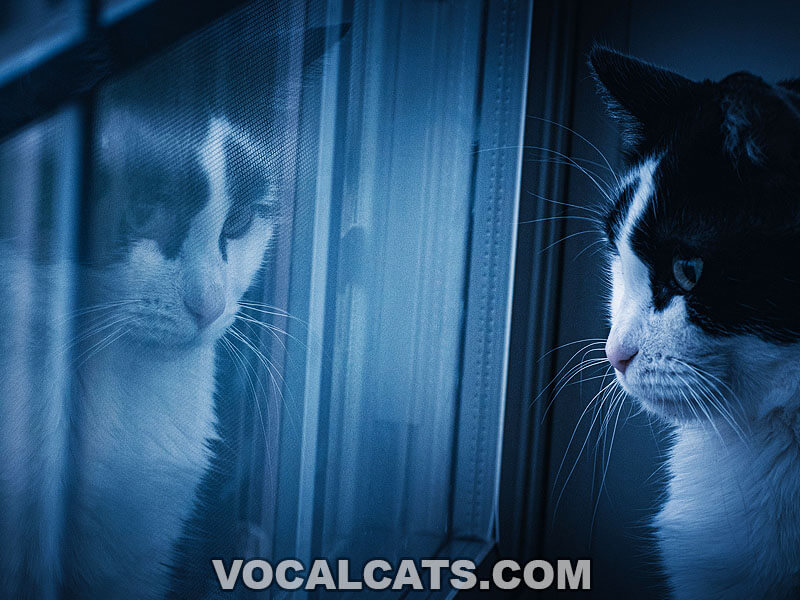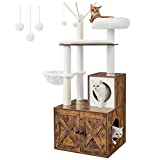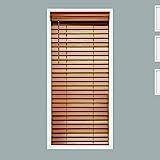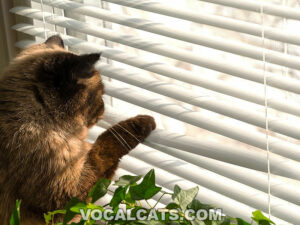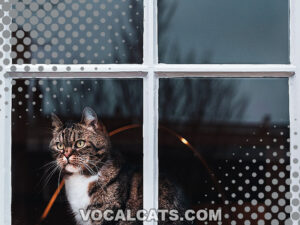Why Does My Cat Look Out The Window At Night? Cats can look out the window at night for multiple reasons. The most common causes for such behavior are boredom, pent-up energy, and being in heat. Other reasons include outdoor noises, age-related disorientation, and territorial/hunting instincts.
Cats like looking out the window at night because they feel energetic or bored. Other reasons for such behavior include territorial instincts, heat cycles, and disorientation. If your fur baby does the same, we can help you understand why.
So, before you search online for further solutions as to why your cat looks out the window all day, take a moment to go through our guide. This article will explain why your cat stares out the window when the sun goes down. There are also valuable insights on cat vision, perception, and predatory instincts!
Contents
- Why Do Cats Like Looking Out The Window At Night?
- Why Do Cats Look Out The Window At Night?
- Addressing Potential Issues
- The Role of Curiosity in Cat Behavior
- Why Does My Cat Stare At Nothing At Night?
- So, Why Do Cats Stare Out The Window At Night?
- Why Does My Cat Look Out The Window At Night And Meow?
- So, Why Does My Cat Look Out The Window At Night?
- Related Questions
Why Do Cats Like Looking Out The Window At Night?
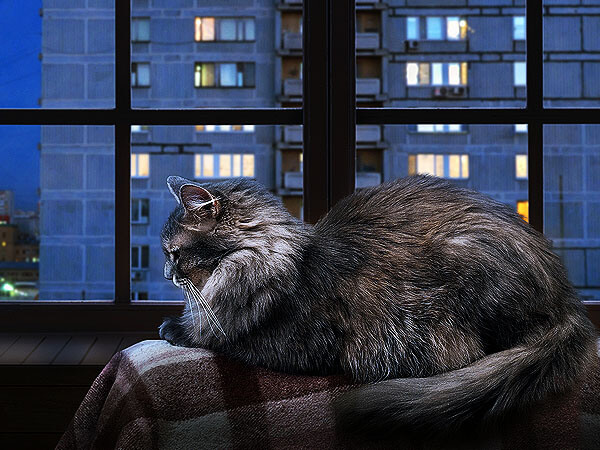
What’s the deal with cats and their fascination with staring into the darkness? Well, there are a few reasons why cats prefer to keep their eyes on the outside world during nighttime.
First, felines love looking out the window because they are natural predators. Even though your fur baby may be fully domesticated, cats are hardwired to enjoy the hunt.
Also, mixed with all this is the feline territorial urge. That means keeping watch for contenders to the turf is another inherent feline trait.
Another explanation for feline window gazing revolves around cats entering their heat cycle. Unneutered (or unspayed) cats will look for potential mates during this time.
And, what better place to pursue potential breeding candidates than the nearest window?
Finally, boredom and pent-up energy are common reasons why felines become window-gazers. Excessive energy leads to restlessness instead of sleep.
That’s why experts recommend feeding your cat its dinner hours ahead of bedtime. That way, your cat has time to work off excess energy and be nice and tired when you turn in for the night.
As for boredom, this is generally a trend for single-pet households. If you have multiple feline pets, they’ll find something to pass the tedious midnight hours together.
RELATED: How To Keep Cats Away From Blinds?
Why Do Cats Look Out The Window At Night?
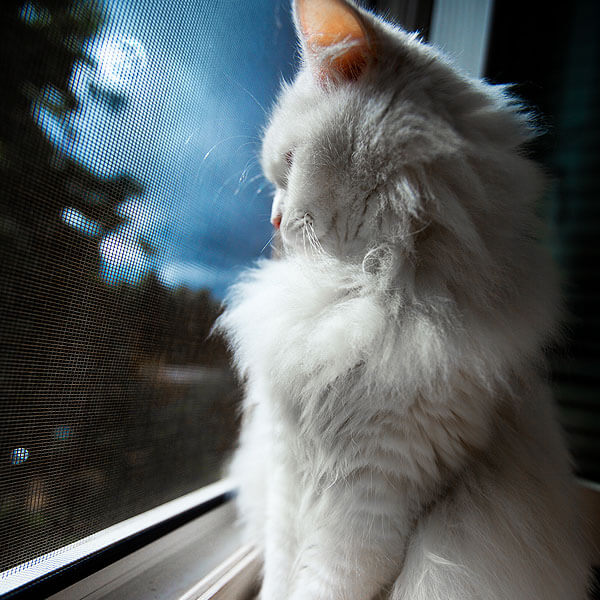
Looking for a more in-depth and science-based answer to why cats like looking out windows at night? Well, that’s what this section is about.
Scroll down to discover how your cat’s vision, mental enrichment, physical stimulation, sounds, and other causes make your fur baby stick close to the window pane.
Understanding Cats’ Vision
If you’re curious about what the world looks like through a cat’s eyes, it’s different from what we see. Not only are feline eyes anatomically distinct, but they also have unique visual perception.
Human and cat eyes include photoreceptors called cones and rods. Cones help with day vision and color; rods are helpful for peripheral and night vision.
RECOMMENDED: Blue Eyed White Ragdoll (Complete Guide)
Human beings have three types of cones that help us see green, blue, and red colors. On the flip side, cats have fewer cones, so they see green and red better than blue.
Another notable difference between human and cat vision is that felines have a higher concentration of rods. This gives them a visual field of 200 degrees and excellent night vision. It means kitties are much better at motion detection, though their vision isn’t as sharp as humans at long distances.
But what does all this mean when it comes to cats staring out windows?
Since your fur baby’s vision works well in low-light settings, it can see much clearer in the darkness. Not to mention, cats have extraordinary motion-detecting abilities at short distances.
They can likely see critters moving about in the dark, which keeps them hooked to the view outside windows. And that’s what makes them return to window-watching night after night.
READ ALSO: How To Keep Cats Out Of Windows?
The World from a Cat’s Perspective
We’ve all heard that saying about cats and curiosity. The truth is felines have inquisitive personalities; that’s why they love observing and exploring their surroundings.
While some fur babies are avid nature watchers during the day, nighttime sights, sounds, and smells offer kitties a completely different experience.
So, while your fuzzy friend is used to watching squirrels and birds, he can see unique wildlife like barn owls, rats, ferrets, and more at night.
Naturally, you can blame your cat for enjoying observing the nightlife when its so different from what he sees during the morning.
RELATED: Why Do Cats Look Out The Window?
Hunting and Predatory Instincts
Your feline friend can’t turn away from window gazing at night because of his predatory instincts.
Domestic cats descended from wild felines who hunt for their survival. Your kitty may not have to worry about its next meal, but nature has hardwired cats to retain their hunting instincts to safeguard the continuation of the species.
Have you noticed how your cat stalks and pounces during playtime? That’s a manifestation of his hunting nature. Give a feline an attractive target, and he can’t help but be tempted to go after it.
Similarly, nighttime window-watching keeps your kitty cat from being bored. Doing so stimulates his hunting instincts, reminding him to keep practicing his running and jumping skills.
The Importance of Mental Stimulation for Indoor Cats
Indoor cats don’t get to explore the great outdoors and hunt like wild ones. If your feline pet isn’t given ample mental and physical stimulation, it can lead to obesity, boredom, and depression.
Looking out the window at night is good for your fluffy companion on multiple levels. Watching critters come out at night will stimulate your kitty cat’s hunting instincts and encourage physical stimulation via running, stalking, and jumping.
Second, gazing out the window will keep your pet mentally stimulated and entertained, keeping boredom and anxiety at bay.
You can also add to your fur baby’s overall well-being by investing in interactive toys and puzzle feeders. These items help keep your pet’s mind active and engaged, preventing lethargy and destructive behavior.
The Importance of Physical Stimulation for Indoor Cats
Physical activity is essential for felines. An active cat will likely maintain a healthy weight bracket and be able to avoid health issues like obesity, joint pains, and diabetes.
In that sense, window-watching is helpful because it encourages your feline companion to run and play by stimulating his natural instincts.
You can add to your feline’s physical stimulation by investing in climbing structures, scratching posts, and toys like feather teasers, which promote movement and exercise.
RELATED: Cat Scratching Litter Box Excessively (10 Reasons Why & What To Do!)
Lack Of Routine And Structure During The Day
Cats are creatures of habit and thrive on routine and structure. Lack of daily routine can lead to behavioral issues in cats. Cats may become bored, anxious, or frustrated when there is no structure in their day.
Establishing a routine for your cat is vital to prevent these issues. This includes feeding, playtime, and sleep schedules. Regular window-watching can also help cats avoid behavioral concerns by mentally engaging them.
Random Sounds Outside The Window At Night
Felines are drawn to looking out of windows because of novel sights and sounds. Things that humans consider background noise are more attractive to cats because of their sensitive hearing.
Felines can pick up 64,000 Hz frequencies, which means they can hear sounds produced at great distances. Additionally, they can rotate their ears almost up to 180 degrees, giving them a broad sense of hearing.
In short, your fur baby can pick up even the slightest outdoor noises, and their natural curiosity will promote further investigation. It’s part of the reason why cats are such adept hunters.
Your Cat Likes to Guard The House At Night
Cats are known for their independent and aloof nature, but they can also be fiercely protective of their homes and loved ones.
If you have noticed your cat prowling around the house at night, it may be because they are guarding you from potential threats.
Felines have excellent senses that allow them to hear and smell things humans can’t. They can detect the slightest sound or scent of something unfamiliar, making them uneasy.
As a result, they may patrol the house or watch through the window to ensure that everything is safe and secure.
While it may be frustrating to be woken up by your cat’s nightly patrols, it is comforting to know they are looking out for you and your home.
RECOMMENDED: Why Does My Cat Sleep On My Pillow? 13 Reasons Why!
Cat’s Estrus Cycle
Female cats go through an estrus cycle, also known as the “heat” cycle, when they are receptive to mating. They may become more vocal, restless, and agitated during this time.
You can also expect your fur baby to be on the lookout for potential mates at this time, leading to increased window watching.
However, this type of behavior is limited to unspayed felines. If your cat is spayed, its reproductive system (fallopian tubes, ovaries, and uterus) has been removed. This will eliminate the estrus cycle and other breeding-related behaviors.
Cognitive Decline in Senior Cats
Cats in their golden or senior years can experience age-related problems like cognitive decline. Feline senility can lead to Cognitive Dysfunction Syndrome (CDS) and issues like a reversed sleeping cycle.
In other words, your elderly fuzzy family member might start sleeping during the daytime only to wake up at night and resume daily activities. For example, your pet might look out the window at night because that’s what it’s used to doing during the day.
However, this can cause cats to become distressed and pretty vocal because their surroundings appear different at night.
While there’s no way to stop age-related cognitive decline, experts recommend keeping your cat mentally stimulated can help.
Increased brain function can help your fur baby overcome senility to an extent and help you retrain your cat to return to its original routine.
Addressing Potential Issues
While cats looking out the window at night has its advantages, it also comes with many downsides. For example, your feline can take to running across the house at top speed, making a racket, and disturbing your sleep.
Pet parents also report destroyed blinds, ripped curtains, broken decorations, and shattered glassware. Besides that, if you’re in the habit of leaving the window open for ventilation, it can pose serious risks if your cat Houdini manages to escape.
One of the most significant risks is the potential for falls, resulting in broken bones, severe injuries, or even death. Cats may be tempted to jump out of the window to pursue prey, putting them in danger if they land in an unsafe area.
So, is there any way to allow your feline to look out the window without getting in trouble or disturbing your rest?
We’ve compiled a list of possible solutions to help you tackle the above issues.
1. Look Into Cat-proofing Solutions
Believe it or not, cat-proofing tends to cover a lot of areas. For example, if you’re worried about your feline ripping through your curtain, try looking for microfiber blackout panels. These curtains are noise-reducing, thermal insulated, and pretty hardy!
For folks with window blinds, think about investing in vinyl blinds. These window coverings are perfect for naughty felines and feature a slippery surface so your pet’s claws have nothing to hold on to or damage.
DON’T MISS: 16 Best Cat Proof Blinds (2023 Reviews & Top Picks)
Finally, if you’re worried about your cat making the great escape and don’t want to give up on ventilation, look for cat-proof window screens. Several screen variations are available on the market, from fiberglass netting to expandable screens and more.
2. Keep Your Room Door Closed
It may seem harsh to keep your fur baby out of your bedroom at night, but sometimes, that’s best for everyone. Felines that get the zoomies regularly or like staying up at night would rather have the whole expanse of your house to explore than just your room.
Plus, keeping your bedroom door shut will help block out the noise your pet’s paws make when they slap against hardwood floors.
3. Get Double-sided Tape
If you’re anxious about your feline knocking your decorations off counters, you can always keep them grounded with double-sided tape. For stuff you can’t tape, it’s best to rearrange to get the items out of your cat’s path.
The Role of Curiosity in Cat Behavior
Sometimes you may feel like your fur baby is trying to annoy you by doing things it shouldn’t. While cats are intelligent, they’re not vindictive.
Moreover, curiosity makes up such a big part of their personality that they prefer to get answers even if it puts them in harm’s way.
So, the next time you see your cat trying to tear a hole in your screen, he’s really not trying to ruin anything. Possibly your fuzzy friend has seen something outside that’s captured his attention and interest, and he wants to explore.
However, no matter how curious your feline may be, if he’s an indoor cat, letting him outside is asking for trouble. Besides the apparent risk of pest infestations, there’s the genuine danger of your furry friend injuring himself or getting into brawls with wild cats.
Thankfully, there are ways you can satisfy your pet’s inquisitiveness without it getting into trouble. How?
That’ll depend on your feline’s nature and the circumstances. For example, if your cat is content in observing the world through the window without trying to get out, you don’t have to worry.
Still, it’s best not to take any chances and have pet-safe window screens installed. That way, you won’t have to stress over your feline escaping.
Why Does My Cat Stare At Nothing At Night?
Cats are mysterious animals and often do things that leave their owners puzzled. One of these behaviors is when cats stare at nothing in particular, especially at night.
Here are some reasons why your cat might be doing this:
Natural Instincts
Cats have an instinct to hunt prey. They are hunters by nature, and even if they are domesticated, they still retain these instincts. When your cat stares at nothing, it might be because it senses something moving, like a bug or a mouse that you can’t see.
Curiosity
Felines are naturally curious. They like to explore their surroundings and investigate anything that catches their attention, even if it’s nothing at all. When your cat stares at nothing, it might be because it’s gathering information about its surroundings.
Attention-Seeking
Pet parents will tell you their felines can be attention seekers, often doing things to get their owner’s attention. When your cat stares at nothing, it might be trying to get your attention, especially if it’s happening at night when you’re more likely to be home and awake.
Sensory Overload
Cats have excellent senses, including their sense of sight. Sometimes, they might need to take a break to process all the information they obtain. It’s the cat equivalent of humans staring into space when too much is happening at once.
So, Why Do Cats Stare Out The Window At Night?
Why does my cat stare out the window at night? The answer is it depends.
Felines can stare out windows for multiple reasons, including boredom, curiosity, and being in heat. They’re also drawn to looking out windows due to their hunting instinct, outdoor noises, and cognitive decline.
The term ‘Cat Stares Out Window At Night’ is a popular search on the internet, but there’s generally nothing for cat parents to be concerned about.
Why Does My Cat Look Out The Window At Night And Meow?
When your fuzzy family members see something exciting or unusual, they will look at it with great interest. So, your cat may look out the window at night and meow because something has grabbed his attention. They may have seen or heard something like a bird or a small animal.
Furthermore, some cats are active at night and get restless and bored when they have nothing to do. They may be trying to communicate their desire for entertainment or stimulation by looking out the window and meowing.
READ NEXT: Are Ragdoll Cats Talkative Or Vocal?
So, Why Does My Cat Look Out The Window At Night?
We’ve reached the end of yet another feline-centric guide and hope our readers have had all their doubts and queries answered.
To recap, cats like looking out the window at night due to boredom, being restless due to pent-up energy, or going through the estrous cycle. They can also be drawn to window-watching due to outdoor noises, their predatory instincts, or age-related cognitive decline.
What matters is cat parents take the time to understand why their pets behave that way. You can generally figure out why your feline is acting a certain way with a bit of knowledge and keen observation.
For instance, if your pet doesn’t get enough activity during the day, it’s bound to be up and running at night. In which case, you might see it staring out the window to pass the time.
Another aspect for cat parents to consider is how they can accommodate their fur babies while ensuring their health and safety. Looking out of windows is well and good, but it can pose serious risks if your pet tries to jump or escape. Being alert will always pay off where cats are concerned.
That’s it from us for now. We’ll be back next time with more cat-related news and views. If you don’t miss out on future feline content, take a moment and subscribe to the website so you’re up-to-date with the latest in the cat community.
Related Questions
For cats, the night is an exciting time. Plus, feline eyes are designed to see in low-light conditions. Cats are also natural hunters and enjoy watching the nocturnal activities of other animals. The darkness also gives them a sense of security, making them feel more relaxed and comfortable at night. Cats also like to look outside at night to explore their surroundings.
DISCLAIMER: THIS WEBSITE DOES NOT PROVIDE MEDICAL ADVICE
The information, including but not limited to, text, graphics, images and other material contained on this website are for informational purposes only. No material on this site is intended to be a substitute for professional veterinary advice, diagnosis, or treatment. Always seek the advice of your veterinarian or other qualified health care provider with any questions you may have regarding a medical condition.

With over five years of specialized experience as an animal writer, my expertise lies in cat nutrition, health, behavior, grooming, and training. I am dedicated to delivering helpful and informative content that caters to the well-being of our feline friends. My primary goal is to empower pet owners with knowledge and ensure our feline companions thrive in health and happiness. In my free time, I love volunteering at local cat rescue centers.
